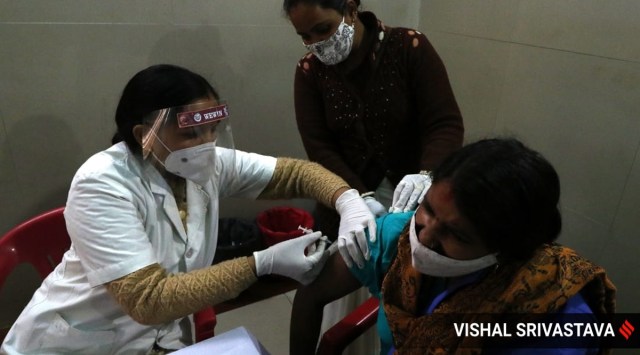- India
- International
Immunisation drive: Poor internet connectivity in Maharashtra tribal districts to pose challenge, officials raise concern
In Maharashtra, officials said the mock drill was conducted only at centres with good internet connectivity. The dry run was held in Jalna, Nandurbar, Nagpur and Pune.
 Covid-19 vaccination dry run being conducted.
Covid-19 vaccination dry run being conducted.With the upcoming large-scale immunisation against Covid-19 depending on an online software, several districts have raised concerns about procedures to follow in remote areas with zero mobile coverage and connectivity. In Maharashtra most of these poor-network areas fall under tribal belts of Nandurbar, Palghar, Gadchiroli, Chandrapur and parts of Amravati and Nashik.
At Tuesday’s press meet, Rajesh Bhushan, secretary, health ministry, said that Co-WIN, a specially designed online software, will be single point of contact for registration of beneficiary at vaccination centre, for issuing vaccine certificate, and for real-time reporting of adverse events following immunisation (AEFI).
The software is also linked with mobile application DigiLocker to store vaccine certificate of beneficiary. The software has been equipped with 12 languages to send sms to beneficiary for date and place of vaccination and intimation for second dose.
In the January 2 nationwide dry run in 286 centres across 125 districts Bhushan said only “minor issues” were found and addressed accordingly.
In Maharashtra, officials said the mock drill was conducted only at centres with good internet connectivity. The dry run was held in Jalna, Nandurbar, Nagpur and Pune. In Nandurbar, district health officer (DHO) Dr Nitin Borke said, “For the dry run, we chose a centre with good network range. But we also conveyed it to the state government that several parts in our district have absolutely no network. We still have no clarity how to handle beneficiaries in these parts,” Borke said.

Nandurbar, the northern tribal district of Maharashtra, has 11,860 health workers in line for immunisation. Dhadgaon and Akkalkuan block, both hilly terrain with no mobile network, have over 3,000 health workers. Borke said they are yet to finalise vaccination sites in these regions.
In heavily forested Gadchiroli, eastern tribal district of Maharashtra, there are 10,000 health workers listed. “In four to five blocks in Gadchiroli we will face problem in using Co-WIN software. We have been discussing possible solutions to it,” said DHO Dr Shashikant Shambharkar.
In Palghar, with 16,000 health workers, hiccups are expected in Mokhada, Dahanu and Jawahar talukas that house tribal population. Dr Dayanand Suryavanshi, DHO, said they plan to ask health workers to travel long distances to areas where network range is good. “We will set up vaccination centres where network will not be a problem. This strategy will have to be changed when we move to next phase to immunise frontline workers and later high risk population because their numbers will be much larger,” he said.
Each district has uploaded data of health workers to the Co-WIN software. Across Maharashtra data of 7.58 lakh health workers is on it. Once the health worker comes for vaccination, his or her name will be tallied in the software. Details of which vaccine is administered and whether adverse event is noted will be fed into it. A vaccination certificate will be generated post vaccination.
Dr Subhash Salunkhe, technical advisor on Covid-19 to Maharashtra government, said internet remains a major concern and these queries are yet to be resolved by the central government. Previously, measles and rubella immunisation has been done manually, with beneficiaries given vaccine shots and their name and details noted down on paper. “This is the first time we are entirely dependent on a software for vaccination,” Salunkhe said.
Maharashtra’s immunisation officer Dr D N Patil said in areas with no network, a list of health workers will be printed from Co-WIN software and physical verification will have to be done. “Entire data of who all were vaccinated and adverse events, if any, will have to be uploaded later when the official gets network. There is no other solution to this,” Patil said.
Meanwhile on January 8 another dry run is scheduled across all 36 districts to look at possible problems.
Apr 24: Latest News
- 01
- 02
- 03
- 04
- 05







































